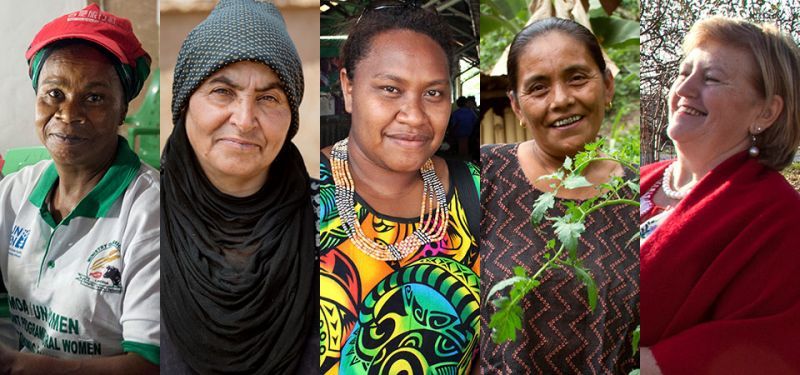
The 62nd United Nations Commission on the Status of Women has included co-operatives in its conclusions on achieving gender equality and the empowerment of rural women and girls.
Representatives of the International Co-operative Alliance, including the Chair of the Gender Equality Committee, Maria Eugenia Perez Zea, the President of the Gender Equality Committee of the Cooperativas de las Americas, Xiomara Núñez de Céspedes and the President of the Indian Cooperative Network for Women (ICNW) and Vice-president of the Gender Equality Committee of the ICA Asia Pacific - acting as chairperson, Dr. Nandini Azad, took active part in the sessions at the commission. They shared the results of the coopsfor2030 campaign and demonstrated the work of co-ops at sessions on achieving the Sustainable Development Goals for rural women and girls.
Held at the UN headquarters in New York from 12-23 March, it recognises “the critical role played by rural women's civil society organisations, trade unions, enterprises and co-operatives in gathering and uniting rural women and supporting them in all spheres”.
And it calls on governments, UN bodies and international and regional organisations to “encourage and facilitate rural women’s entrepreneurship and expand opportunities for their enterprises, co-operatives and self-help groups”.
This includes helping rural women to diversify and increase their productivity by engaging in sustainable agriculture, fisheries, aquaculture, including mariculture, cultural and creative industries and other areas of economic activity, and to improve access to financing and investment, technology and infrastructure, training and diverse markets.
The report also recommends increased procurement from rural women’s enterprises, including co-operatives. Rural women’s skills and capacities should be boosted so they can benefit from procurement processes such as public food programmes, and can access local, national and international value chains and markets.
Another recommendation which offers a role for the co-operative sector calls for measures to facilitate financial inclusion and financial literacy of rural women and their equal access to formal financial services. It says financial institutions, including co-operatives, should be encouraged to provide access to financial products, services and information to rural women, using innovative tools and platforms, including online and mobile banking.
The commission also recommends steps to “protect and promote the rights to freedom of association, peaceful assembly and collective bargaining so as to enable rural women workers and entrepreneurs to organize and join unions, cooperatives and business associations”.
And it wants to see support for “the effective participation, decision-making and leadership of rural women in enterprises, farmer and fisher organisations, producer co-operatives, trade unions, civil society and other relevant organisations ensuring a safe and enabling environment.”
Among the panels cooperative representatives took part in, Dr. Azad participated in a session organised by the Indian Ministry of Women and Child presenting the work of the International Co-operative Alliance and the role of the ICA Asia - Pacific Gender Equality Committee. "Social change is coming through the work of the Indian Cooperative Network for Women which is one of the few that addresses both violence against women and financial inclusion", said Dr. Azad.
The Director of policy of the Alliance, Rodrigo Gouveia shared the experience of co-operatives at the session “Delivering as One: Achieving the SDGs with and for rural women and girls”. "In co-operatives, the wealth generated stays in the community, creating local jobs and sustainable activities. As enterprises based on values, owned and controlled by its members, it is a very well suited model for women to build their own future and crucial to make rural women and girls actors of development rather than just beneficiaries of aid", said Mr. Gouveia. At the session Powering Potential presenting the results of a new report published by the UN Foundation and BNY Mellon exploring the economic opportunity of closing the gender gap in women's access to financial tools, Mr. Gouveia took the floor to share how co-operatives are a way to ensure women benefit from increased wealth from financial inclusion.
A side event organised by the Permanent Mission of the Dominican Republic to the United Nations focused on the role of co-operatives in the empowerment of rural women. Panellists shared case studies from the Dominican Republic on economic empowerment for rural women; increased financing for co-operatives by the government; democratisation of credit; and the facilitation of free financial education. Also speaking at the event was Alette van Leur, Director of the Sectoral Policies Department (SECTOR) and coordinator of the ILO policy outcome area on “decent work in the rural economy”. She reflected on the role of co-operatives in: creating jobs and increasing income for women workers; improving livelihoods through the provision of basic services; and boosting women’s leadership and management experiences.
The co-operative delegation met representatives from We effect (formerly Swedish Cooperative Centre) who works with organisations in more than 20 countries, towards the vision of a sustainable and just world free from poverty through cooperation, and discussed on mutual collaboration.
Read the Alliance declaration to mark International Women’s Day on March 8.
Photo: exhibit sponsored by UN Women, highlights some of their issues and shares some of their stories (c) UN Women




